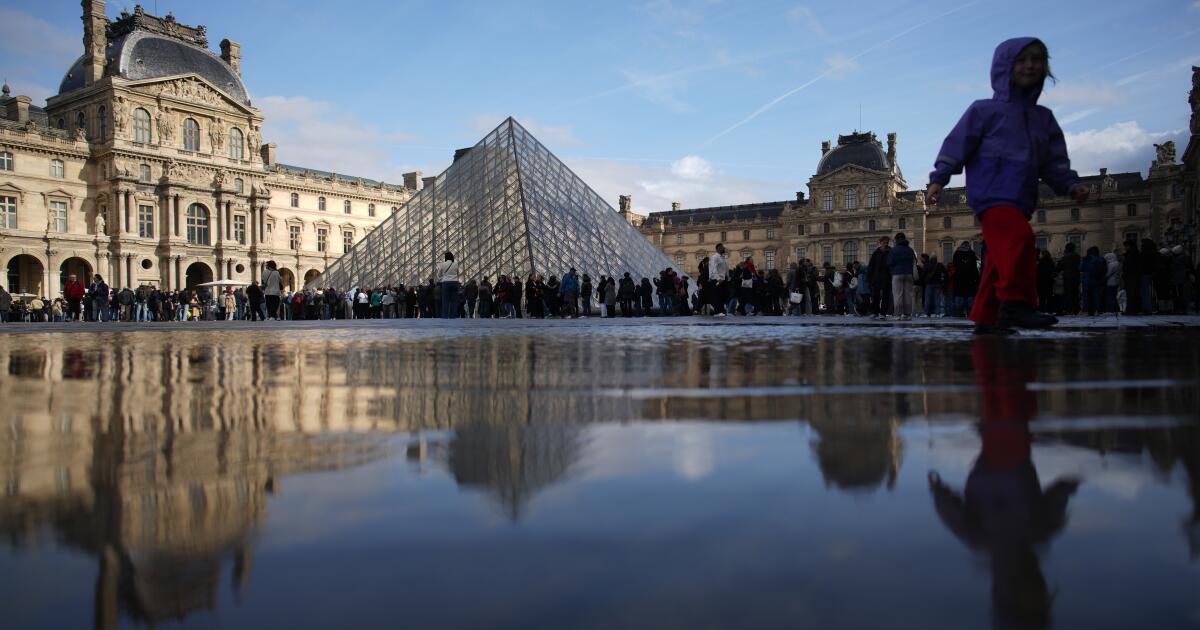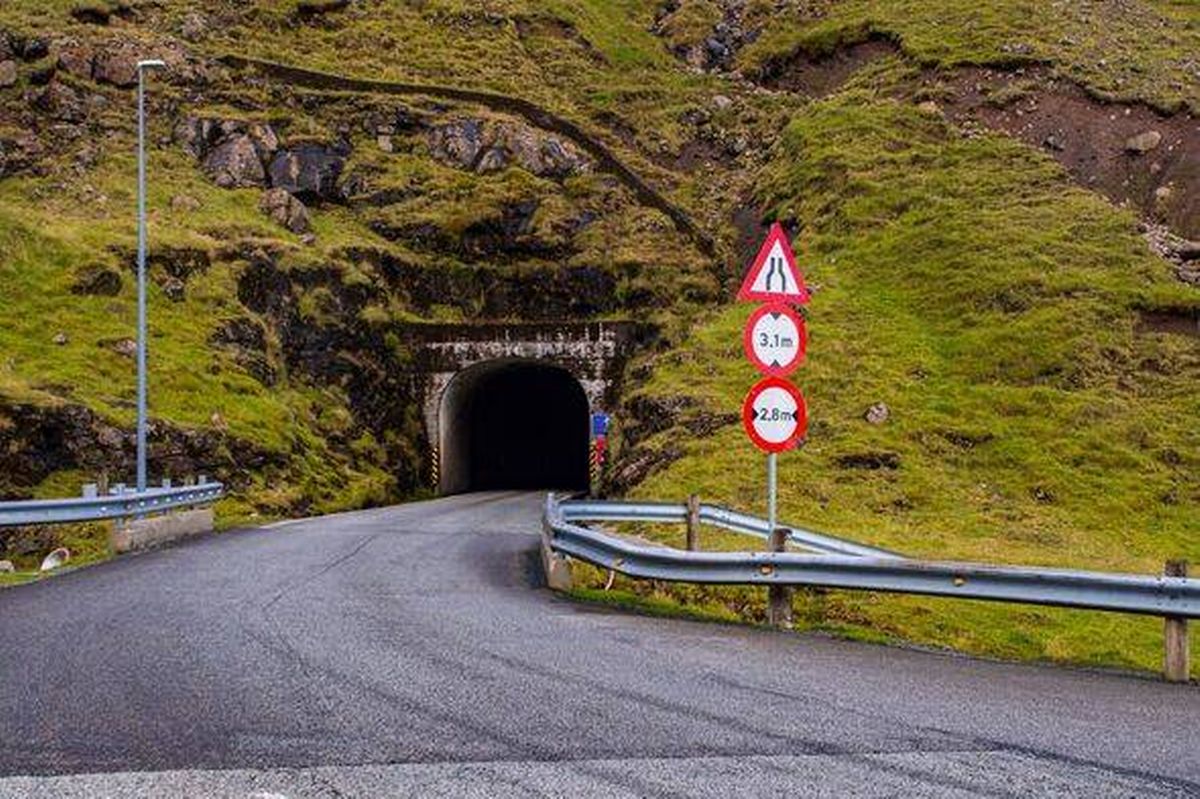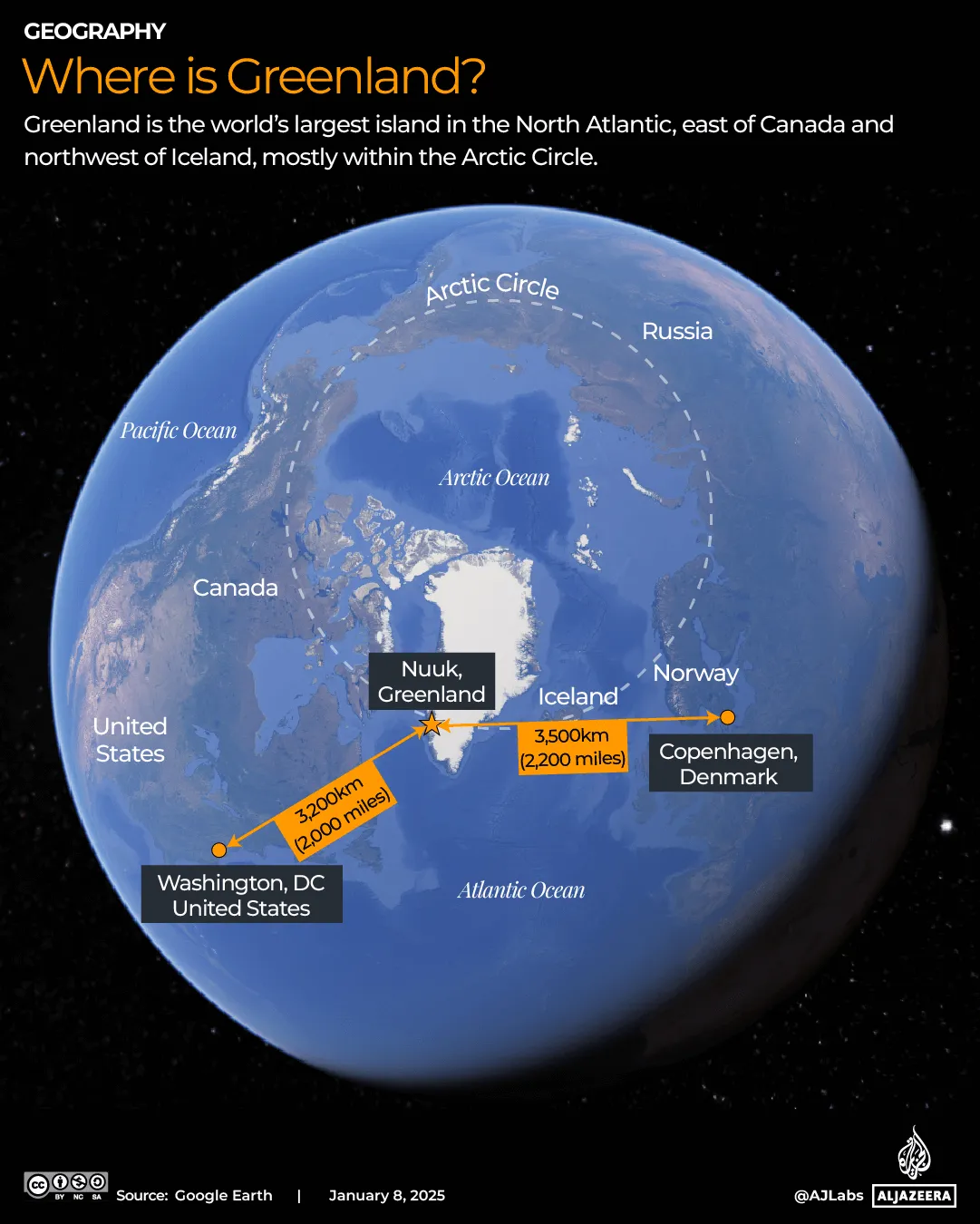US President Donald Trump sees Greenland as a United States national security priority to deter Washington’s “adversaries in the Arctic region”, according to a White House statement released on Tuesday.
The statement came days after Trump told reporters that the US needs Greenland from a national security perspective because it is “covered with Russian and Chinese ships”.
Recommended Stories
list of 4 itemsend of list
Here’s what you need to know about what Trump said, whether Russia and China are present in Greenland, and whether they do pose a threat to American security.
What has Trump recently said about Greenland?
“Right now, Greenland is covered with Russian and Chinese ships all over the place. We need Greenland from the standpoint of national security,” Trump told reporters aboard Air Force One on January 4.
The White House statement on Tuesday fleshed out further details on how the US would go about its acquisition of Greenland.
“The president and his team are discussing a range of options to pursue this important foreign policy goal, and of course, utilizing the US military is always an option at the commander-in-chief’s disposal,” the White House statement says.
Over the course of his second term, Trump has talked about wanting Greenland for national security reasons multiple times.
“We need Greenland for international safety and security. We need it. We have to have it,” he said in March.
Since 1979, Greenland has been a self-governing territory of Denmark, and since 2009, it has had the right to declare independence through a referendum.
Trump has repeatedly expressed a desire to take control of the island, which hosts a US military base. He first voiced this desire in 2019, during his first term as US president.
As a response, leaders from Greenland and Denmark have repeatedly said that Greenland is not for sale. They have made it clear that they are especially not interested in becoming part of the US.
On January 4, Denmark’s Prime Minister Mette Frederiksen said, “It makes absolutely no sense to talk about the US needing to take over Greenland.”
“The US has no right to annex any of the three countries in the Danish kingdom,” she said, alluding to the Faroe Islands, which, like Greenland, are also a Danish territory.
“I would therefore strongly urge the US to stop the threats against a historically close ally and against another country and another people who have very clearly said that they are not for sale,” Frederiksen said.
US special forces abducted Venezuelan President Nicolas Maduro during an operation in the Venezuelan capital, Caracas, on January 3.
Hours later, Katie Miller, the wife of close Trump aide and US Homeland Security Advisor Stephen Miller, posted a photo on X showing the US flag imposed on the map of Greenland.
Greenland’s Prime Minister Jens-Frederik Nielsen hit back in an X post, writing, “Relations between nations and peoples are built on mutual respect and international law – not on symbolic gestures that disregard our status and our rights.”
Why does Trump want Greenland so badly?
The location and natural resources of the Arctic island make it strategically important for Washington.
Greenland is geographically part of North America, located between the Arctic Ocean and the North Atlantic Ocean. It is home to some 56,000 residents, mostly Indigenous Inuit people.
It is the world’s largest island. Greenland’s capital, Nuuk, is closer to New York City – some 2,900km (1,800 miles) away – than the Danish capital Copenhagen, which is located 3,500km (2,174 miles) to the east.
Greenland, a NATO territory through Denmark, is an EU-associated overseas country and territory whose residents remain European Union citizens, having joined the European Community with Denmark in 1973 but having withdrawn in 1985.
“It’s really tricky if the United States decides to use military power to take over Greenland. Denmark is a member of NATO; the United States is a member as well. It really calls into question what the purpose of the military alliance is, if that happens,” Melinda Haring, a senior fellow at the Atlantic Council Eurasia Center, told Al Jazeera.
Greenland offers the shortest route from North America to Europe. This gives the US a strategic upper hand for its military and its ballistic missile early-warning system.
The US has expressed interest in expanding its military presence in Greenland by placing radars in the waters connecting Greenland, Iceland and the United Kingdom. These waters are a gateway for Russian and Chinese vessels, which Washington aims to track.
The island is also incredibly rich in minerals, including rare earth minerals used in the high-tech industry and in the manufacture of batteries.
According to a 2023 survey, 25 of 34 minerals deemed “critical raw materials” by the European Commission were found in Greenland.
Greenland does not carry out the extraction of oil and gas, and its mining sector is opposed by its Indigenous population. The island’s economy is largely reliant on its fishing industry.

Are Chinese and Russian ships swarming Greenland?
However, while Trump has spoken of Russian and Chinese ships around Greenland, currently, facts don’t bear that out.
Vessel tracking data from maritime data and intelligence websites such as MarineTraffic do not show the presence of Chinese or Russian ships near Greenland.
Are Russia and China a threat to Greenland?
The ships’ location aside, Trump’s rhetoric comes amid a heightened scramble for the Arctic.
Amid global warming, the vast untapped resources of the Arctic are becoming more accessible. Countries like the US, Canada, China and Russia are now eyeing these resources.
“Russia has never threatened anyone in the Arctic, but we will closely follow the developments and mount an appropriate response by increasing our military capability and modernising military infrastructure,” Russian President Vladimir Putin said during an address in March 2025 at the International Arctic Forum in the Russian city of Murmansk, the largest city within the Arctic Circle.
During this address, Putin said that he believed Trump was serious about taking Greenland and that the US will continue with efforts to acquire it.
In December 2024, Canada released a policy document detailing plans to ramp up its military and diplomatic presence in the Arctic. Russia is also constructing military installations and power plants in the region.
Meanwhile, Russia and China have been working together to develop Arctic shipping routes as Moscow seeks to deliver more oil and gas to China amid Western sanctions while Beijing seeks an alternative shipping route to reduce its dependence on the Strait of Malacca.
The Northern Sea Route (NSR), a maritime route in the Arctic Ocean, is becoming easier to navigate due to melting ice. The NSR can cut shipping trips significantly short. Russia is hoping to ramp up commerce through the NSR to trade more with Asia than Europe due to Western sanctions. Last year, the number of oil shipments from Russia to China via the NSR rose by a quarter.
China is also probing the region, and has sent 10 scientific expeditions to the Arctic and built research vessels to survey the icy waters north of Russia.






